Ukrainian Jew fighting for Ukraine and Israel in Italy
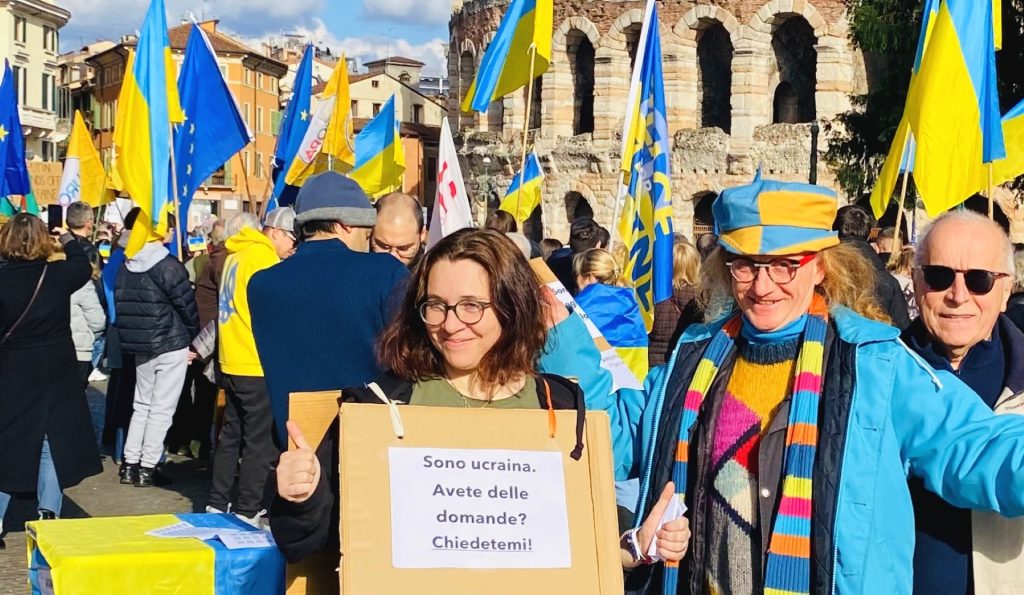
Marina Sorina, a native of Kharkiv, is a professional guide in Verona, a translator, and an active participant in Italian political life. In an exclusive interview, she talks about having a Ukrainian-Jewish identity after living in Italy for almost 30 years and the experience of social advocacy for the two countries close to her heart.
Shimon Briman (ShB): How did you identify yourself in Kharkiv in the 1990s before leaving for Italy — as a Jew or as a Ukrainian? What Jewish, Ukrainian, or European cultural background did you bring along to Italy?
Marina Sorina (MS): My main identity has always been Jewish. Since I was a child, I knew I was Jewish. In addition to my family, I was surrounded by classmates and teachers with the same bright background. I perceived this identity as a sign of quality, obliging me to always be on top.
When I came to Italy, it was hard for me to find understanding because being a Jew here is a purely religious fact and thus very intimate and private. Jews in Italy are few and far between. They have been emancipated for so long that they are no longer a distinct social category.
I didn't want to put up with this "invisibility," so I would explain the entire chain of identity every time: "I am a Russian-speaking Ukrainian Jew with Italian citizenship." Italians often classified me as "Russian," which annoyed me, and I denied it every time for decades. Sometimes, I would get tired and, when asked, "Where are you from?" I would point to the city district, Veronetta.
After 2022, Ukrainian became my most important identity. The people I talked to called me Ukrainian as they associated me with these topics. And yet, at the first opportunity, I would explain I was a "Ukrainian Jew."
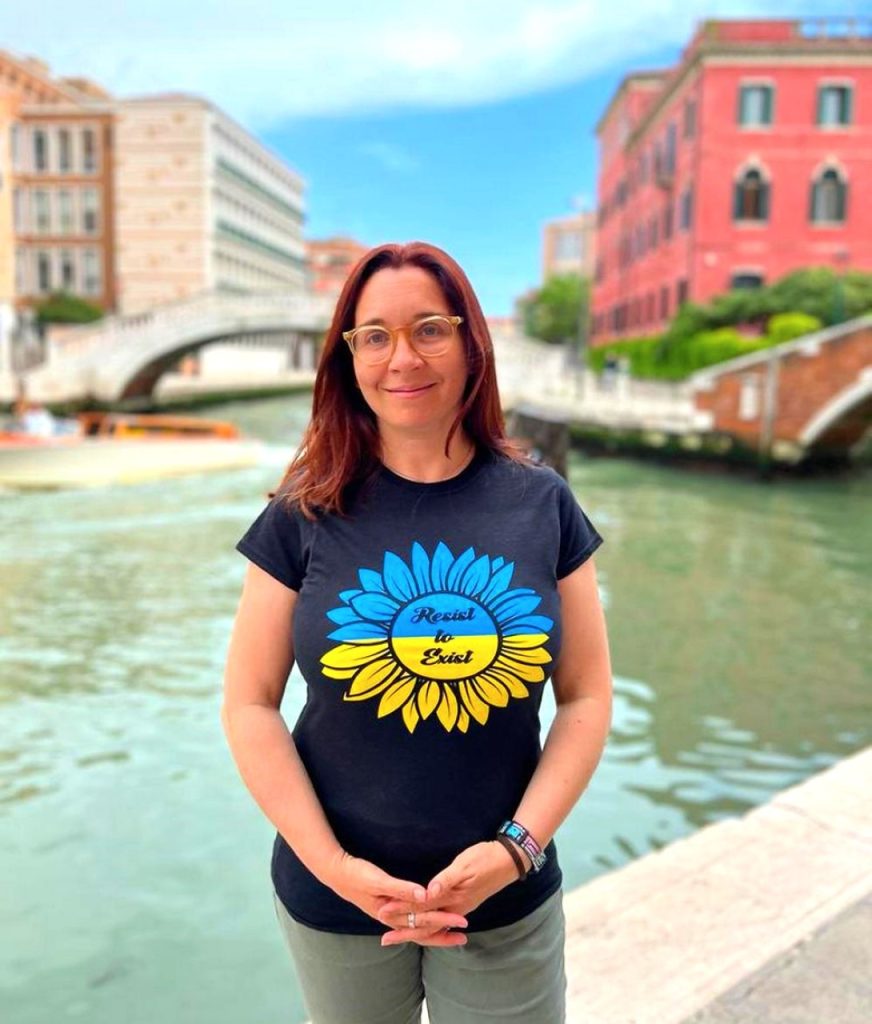
ShB: Why did Italy attract you as a country of residence? What stages of integration into the new society did you go through?
MS: Initially, I decided to go to Israel, but I came to Italy on vacation in 1995 and stayed here forever for personal reasons. I experienced the same phases with regard to Italy as in personal relationships: first acquaintance, curiosity, charm, deeper knowledge, and disappointment over shortcomings that are revealed only in everyday life. For many years, I was sure I had made the wrong choice as I lacked a circle of people in Verona with whom I could freely express myself.
The moment that changed my attitude came in 2010, 15 years after immigration. I met the man who is now my husband, and I have not felt lonely since then.
Soon after that, I passed a very hard qualification exam to be a tourist guide. I chose a creative profession that did not limit my freedom. Studying Verona's history helped me better understand the reasons behind the Veronese mentality. Learning more about the city's present and historical past enabled me to accept its peculiar aspects.
Initially, I was an office worker in Verona. I then studied at a university and, after graduation, went on to do postgraduate studies. In 2006, I published my first novel, which was followed two years later by a collection of short stories set in Veronetta, the city's most lively and multiethnic old quarter, where I feel at home.
ShB: Why did the topic of Ukraine become important in your life when you were so far from Ukraine?
MS: Until the fall of 2013, Ukraine interested me no more than other countries, although I went there every year to see my parents. My main task was integration in Italy, and I did not think too much about the country where I was born. It was a place where I went on vacation and visited relatives. I saw that it was changing for the better, becoming more beautiful and modern, but it was not the focus of my thoughts.
In November 2013, I was in Kyiv on a business trip and saw the beginning of protests on Independence Square. I started following the protests and returned in December specifically to become a part of this huge process. This experience changed my attitude: I felt Ukraine's European potential and the power of popular mobilization.
In February 2014, I joined the local Ukrainian association "Malve di Ucraina" (Mallows of Ukraine). Its members were primarily Ukrainian women who sought to preserve their identity and explain it to Italians. We organized numerous events, including rallies, celebrations, cultural meetings, fundraisers, and humanitarian aid shipments.
Over the years, we slowed down, mainly organizing traditional holiday celebrations and helping cancer children who came from Ukraine to Verona to receive treatment.
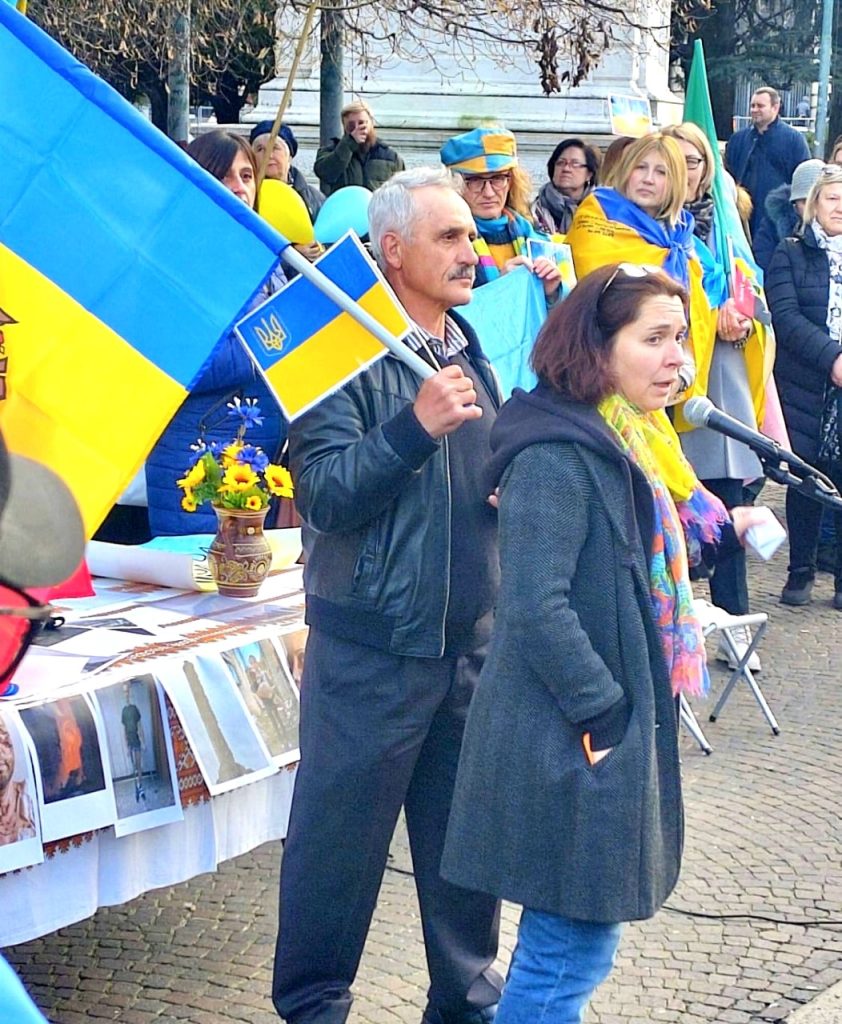
ShB: What did you feel when you learned about the attack on Ukraine in February 2022?
MS: I was not surprised. I was outraged but not scared. It became clear that from then on, I would have to devote most of my efforts to helping refugees.
In fact, we were very busy for the next six months as we helped the refugees who were arriving in large numbers. We tried to become mediators between them and the Italian society. They had many needs: housing, language courses, documents, clothes, and psychological support.
At the same time, we had to explain to the local residents what was happening back in Ukraine. During this time, I wrote many articles to convey correct information to Italian society.
For about a year, there was an intense period of helping refugees, informing Italians about Ukraine, and raising money for humanitarian aid. Moreover, we organized numerous rallies, exhibitions, and poetry soirees. We did everything we could to make Italians aware of the situation in Ukraine.
ShB: What exactly did you do to help Ukrainian refugees fleeing the war?
MS: For example, refugees arrived with small bags and no summer clothes in the spring of 2022, and the existing reception centers were not interested in helping them. That is why we set up our own center where we could collect and distribute clothes to Ukrainians, later adding foodstuffs and medications.
To do this, we needed to find premises, donors, furniture, and then volunteers who would come to open, distribute, and clean. When we solved the logistical problems, many families reached out for help. We also had to handle the bureaucratic aspects: registration, questionnaires, and requests that needed to be processed. Gradually, a group of people formed who always helped, and bonds of friendship and psychological support emerged.
This continued until the winter of 2024, when the municipal authorities decided to use our premises for another purpose. We had to close our center, but by that time, most of the refugees had already settled down, found sources of income, or returned to Ukraine. But we know that we helped them in the most difficult moment.
ShB: Has the war in Ukraine affected your creative work?
MS: Yes, after 2022, I thought it would be better to focus on promoting Ukrainian culture, so I translated two books into Italian. The first is a poetry collection by Oksana Stomina from Mariupol, who is not only an excellent poet but also an eyewitness of the atrocities committed by the Russians in Mariupol and the wife of a prisoner of war from Azovstal.
The second book also relates to the Ukraine topic and approaches it from the military and feminine perspectives. It's My Women by Yulia Ilyukha, the author of short texts that contain the stories of Ukrainian women going through the most difficult situations.
I hope to be able to translate and then write in the future, but the priority for now is to continue organizing events related to the crises in Ukraine and Israel.
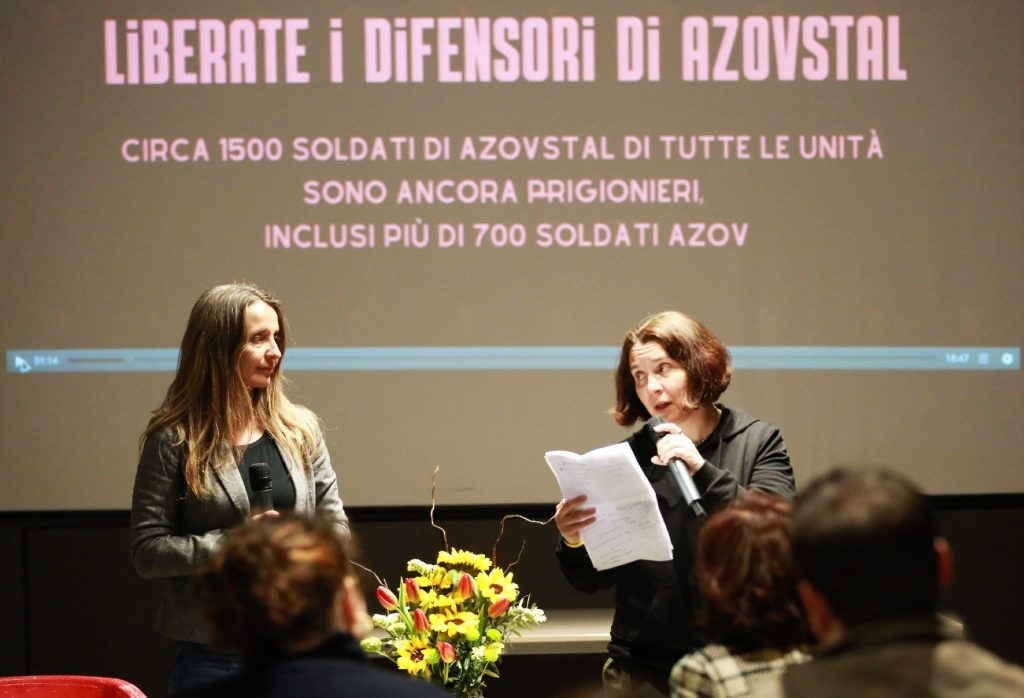
ShB: You went to Kharkiv not so long ago. What did you feel when the city came under missile and bomb attacks?
MS: My parents continue to live in Kharkiv. After a break during COVID-19 and the first year of the war, I returned to Kharkiv in August 2023. It was a relatively quiet time when many refugees also decided to return. Air raid sirens would sometimes go off, but in general, if you wanted to see signs of destruction, you would have to look hard for them.
In June 2024, after May, when the city was attacked with manic brutality by the Russian army, the situation changed completely. Compared to the usual rhythm and even last year, the streets were empty; the absence of men was striking. Walking in downtown Kharkiv would quickly reveal badly damaged historical buildings.
At the same time, life goes on. The city is clean; flowers are everywhere. There are flower beds that the municipal authorities take care of in a slightly exaggerated way, to be honest. I prefer the flowers planted in front gardens by residents who maintain them with great love. If you can't affect the big picture, at least take care of your garden and start by creating beauty that lifts your spirits in difficult times.
In Kharkiv, restaurants and cafes, markets and supermarkets, and shopping and cultural centers are open. Of course, air raid sirens are often heard, meaning constant attacks, but most residents ignore them. Everyone knows that the distant sound of impact indicates potential destruction.
During my stay, a fatal strike like that struck just a stone's throw away from the Kharkiv bus station, where many travelers arrive. Residential buildings hit by missiles, people dying, and destroyed homes— having seen all of this with my own eyes, I become even more convinced in my resolution to continue helping Ukraine.
ShB: How do you take the news about the tragedies of this war?
MS: In the first days of the war, I was poisoned by the news. My husband and I constantly followed the news, each monitoring their own channels. We could not sleep at night because we were absorbed in the news all the time. So, I introduced a rule in April: no news after dinner.
I had to have the strength to face the reality in Verona, where people were coming out of the train station building, not knowing where to go. There were many critical situations; there was an urgent need to raise funds to send aid to Ukraine. So, I pushed the news to the background and focused on practical efforts.
However, since then, the first thing I do every morning is check the news from Ukraine and, since October 2023, also from Israel. It is impossible to turn away because the reality of war affects the life of every European citizen, even if not everyone realizes it.
ShB: Has the terrorist war against Israel affected you in Verona?
MS: Since 7 October 2023, there has been an additional need to support Israel and explain developments there to Italians, who are often influenced by political fashion and do not have the necessary information for a sober assessment of the situation.
With a group of friends, we organized a rally in Verona to mark six months since the attack and to remember the victims. People from many other cities came to support us that day.
ShB: How are the various political forces in Italy divided over Ukrainian and Israeli topics? Can you find a party or politicians who are both pro-Ukrainian and pro-Israeli?
MS: In short, supporting Israel and Ukraine does not increase the popularity of the parties. Most of the electorate is indifferent to geopolitical issues and wants to think about local problems or is pro-Russian and pro-Palestinian.
Numerically, Jews are a small minority. Therefore, only small parties of a liberal-radical orientation can afford the "luxury" of being pro-Ukrainian and pro-Israeli. This stance does not help them get more votes, which is one of the reasons why we did not perform well in the European elections.
ShB: Could you tell us more about your party and your attempts to run for the European Parliament? What kind of support did you receive, and how openly do you express your views on Ukraine and Israel?
MS: I joined the Più Europa (More Europe) party in the spring of 2022 because they were the only ones who expressed unrestricted support for Ukraine and were not afraid to condemn the Russian dictatorship. Other parties also sometimes came out in support of Ukraine but did not have the courage to condemn Russia at the same time.
I was invited to participate in the municipal elections in an alliance with other parties to elect a center-left mayor. I agreed, even though I was very busy volunteering and would get exhausted. Any opportunity to talk about Ukraine was important.
Our mayoral candidate won, and two of our party members took important municipal offices. That time, my efforts paid off. After a few months, extraordinary parliamentary elections were held in the middle of summer, and my party failed to clear the four-percent threshold.
In the spring of 2024, there were elections to the European Parliament, and I was nominated again. I was not the only candidate of Ukrainian origin. A friend of mine was nominated by the same party in the same district, and another friend from a competing party ran in another district. Fortunately, we didn't have to compete directly with each other.
This time, I was calmer and gave it my all. I held many meetings with voters and handed out leaflets on the streets in different cities.
The result exceeded my expectations: I got more votes than some more experienced politicians. Unfortunately, it was not enough because our party again failed to clear the threshold at the national level.
In this way, people supported political forces that were unable to provide unconditional support to Ukraine, let alone Israel, even if some individual politicians may be on our side and try to change things within the party. Therefore, this result left a bitter taste: I know I did my job well, but it hasn't changed anything in reality.
ShB: Looking at Italy, Ukraine, and Israel from Verona, what hopes, dreams, and forecasts do you have for the future?
MS: I dream of Ukraine and Israel returning to peaceful development and cooperation with the democratic world. I want both countries to be able to resume progress in the direction in which they were heading before the war. Ukraine was getting closer to NATO and EU integration, while Israel was moving toward the "Abraham Accords" and establishing relations with progressive Muslim countries, such as Morocco, where my husband comes from.
Unfortunately, both dreams seem unattainable so far. There are many traumas, and the loss of so many lives is excruciating. It will be difficult to forget the behavior of those who did not keep their promises and failed to support us in a time of trouble. But precisely because the task is important and difficult, we must act in order to win.
I cannot join the army, but I can at least use my abilities to explain to those in Italy who still do not understand whose side they must be on in this conflict between civilization and barbarism.
These days, Marina Sorina is helping organize an Italian visit to Ukraine. Nearly 100 people from all over Italy are coming, including politicians and public and religious figures who support Ukraine. On 11-12 July 2024, the delegation will hold an action in Kyiv to express solidarity with the people of Ukraine and join a common prayer involving representatives of different religions. The Italian guests, including Marina, will learn about the efforts of Ukrainian non-governmental organizations during the war.
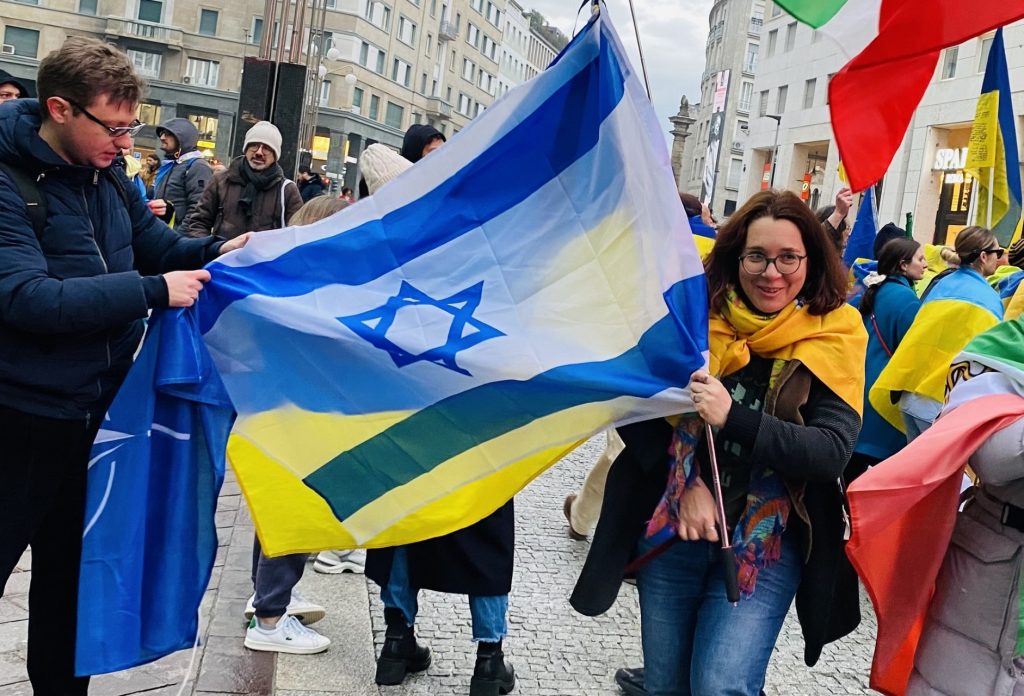
Interviewed by Shimon Briman (Israel)
Photos from Marina Sorina's personal archive.
Translated from the English by Vasyl Starko.




















